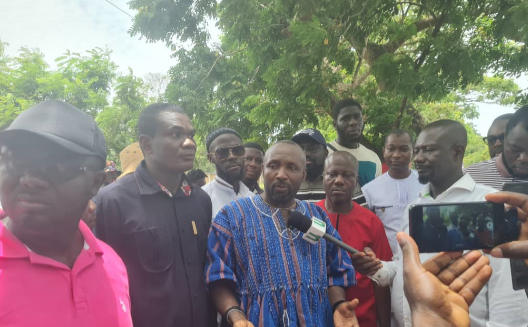The Kawukudi office of the National Intelligence Bureau (NIB) became the focal point of a significant protest on a recent Saturday, as scores of supporters of the opposition New Patriotic Party (NPP) rallied against the arrest and detention of one of their own, Mohammed Amadou Zakuo. This mobilization underscores the escalating tension surrounding freedom of speech and political expression in the country, as the incident involving Zakuo comes amidst a broader context of similar arrests and accusations of political persecution. The NPP supporters, visible in their party colours and carrying placards denouncing the arrest, gathered to demand the immediate release of Zakuo, arguing that his detention infringes upon his fundamental right to express himself freely. This demonstration highlights the delicate balance between maintaining national security and protecting individual liberties, a balance that has been increasingly strained in recent times.
The catalyst for Zakuo’s arrest was reportedly a Facebook post concerning Vice President Naana Jane Opoku Agyemang. While the exact content of the post remains unclear, it apparently drew the attention of the NIB, leading to Zakuo’s apprehension and subsequent detention. This action sparked immediate outrage amongst NPP members, who perceive it as an overreach of power and an attempt to suppress dissent. The incident has also fueled speculation about the motivations behind the arrest, with some alleging that it is politically motivated given Zakuo’s affiliation with the opposition party. The NIB, however, has remained tight-lipped about the specifics of the case, further contributing to the growing public speculation and fueling the protests.
The swift response from senior NPP officials indicates the gravity of the situation and the party’s determination to secure Zakuo’s release. Prominent figures such as John Boadu, the Former General Secretary, and Divine Otto, the Greater Accra Regional Chairman, personally intervened, engaging with NIB officials to negotiate bail for the detained supporter. Their presence at the protest site not only offered support to Zakuo but also served to calm the escalating tensions and ensure the demonstration remained peaceful. This direct involvement of senior party officials underscores the NPP’s commitment to defending the rights of its members and also seeks to portray the party as a staunch advocate for freedom of expression.
The incident involving Zakuo reflects a broader concern about the increasingly restrictive environment for free speech in the country. Recent years have witnessed a series of arrests and detentions of individuals critical of the government, sparking debates about the boundaries of acceptable speech and the potential misuse of state power to silence dissent. Critics argue that these actions create a climate of fear and self-censorship, undermining democratic principles and discouraging open dialogue. Conversely, the government maintains that such measures are necessary to maintain national security and prevent the spread of misinformation, especially in the age of social media.
The detention of Mohammed Amadou Zakuo, triggered by a seemingly innocuous Facebook post, has ignited a firestorm of controversy, raising fundamental questions about the balance between free speech and national security. The swift reaction from the NPP, coupled with the public protests, demonstrates the sensitivity surrounding this issue and the potential for such incidents to escalate into larger political confrontations. The case has also brought into sharp focus the role of social media in political discourse and the challenges faced by authorities in regulating online content without infringing upon fundamental freedoms.
Moving forward, the handling of this case will have significant implications for the political landscape and the broader discourse on freedom of expression. The outcome will not only determine the fate of Mohammed Amadou Zakuo but also set a precedent for future cases involving online speech and alleged criticism of government officials. It is imperative that the NIB operates with transparency and adheres to due process to ensure that justice is served and that fundamental rights are protected. Furthermore, this incident calls for a wider national conversation about the responsible use of social media, the limits of free speech, and the need for a legal framework that balances national security concerns with the fundamental right to express oneself freely without fear of reprisal.














